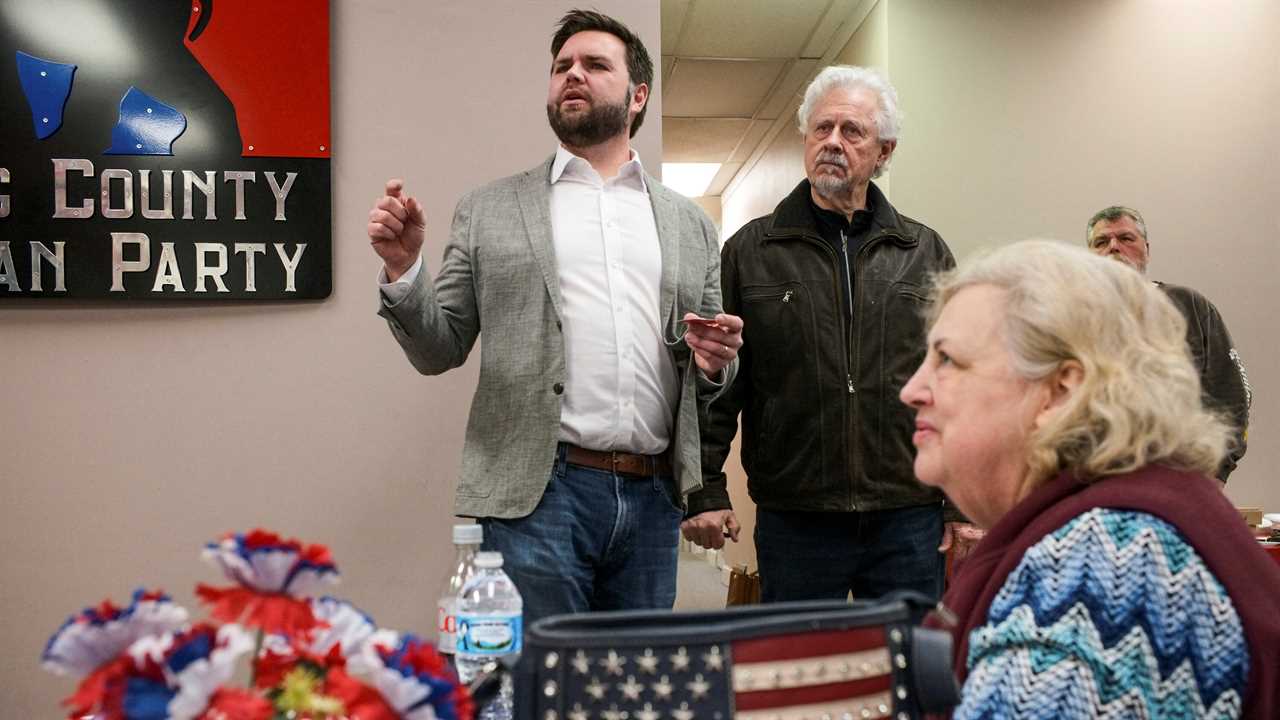
You won’t find a clearer distillation of the Republican Party’s divide on foreign policy than the sparring that broke out this weekend in Ohio over Ukraine.It’s a skirmish that pits Trump-style, “America First” isolationists against more traditional hawkish Republicans. And while strategists in both parties say voters are much more concerned about pocketbook issues like inflation than they are about national security, the contrasting messages reflect a Republican Party that remains deeply torn between a base still loyal to Donald Trump and an elite seeking to move beyond him.On one side of the split is J.D. Vance, who has sought to parlay his celebrity as the author of “Hillbilly Elegy” into a Senate seat.On the other is Jane Timken, a former state party chair who represents the closest thing in the race to an establishment candidate.Timken has run a campaign focused on inflation, immigration, “parents’ rights” and crime. On Ukraine, she put out a statement Monday that was perfectly in tune with the Senate Republicans she hopes to join: supporting Ukraine’s sovereignty and calling for sanctions on Russia, while condemning Biden for what she called “weak and feckless leadership.”But Vance, a Yale Law School graduate who served in the Marines in Iraq before becoming a venture capitalist, staked out a wildly different position.“I don’t really care what happens to Ukraine one way or another,” Vance said in a podcast interview.A retired Army general, Barry R. McCaffrey, blasted those comments on Twitter. “JD Vance is a shameful person unsuitable for public office. His comments are those of a stooge for Russian aggression,” said McCaffrey, who led an infantry division during the Persian Gulf war of 1991 and has since become a television news analyst, defense consultant and Trump critic.To which Vance replied: “Your entire time in military leadership we won zero wars. You drank fine wine at bullshit security conferences while thousands of working class kids died on the battlefield. Oh, by the way, how much do you stand to gain financially from a war with Russia, Barry?”The exchange might as well have been ripped from Trump’s playbook. Trump, of course, famously derided John McCain’s war record during the 2016 presidential campaign.At a candidate event in Iowa in July 2015, Trump dismissed the Arizona senator’s service in Vietnam, saying, “I like people who weren’t captured.”At the time, his statement was widely seen as a fatal blunder. What politician in their right mind would attack a decorated war hero, a man who withstood torture in a Vietnamese prison for 5 years? And in a Republican primary, no less?ImageJane Timken attending a county Republican meeting in Columbus, Ohio, last month.Credit...Maddie McGarvey for The New York TimesDefining ‘America First’
What many pundits didn’t recognize at the time was how many Republican voters harbored a deep antipathy to foreign entanglements after years of overseas interventions that they saw as a failure.“The G.O.P. base were the ones who saw their kids from red states die and get wounded in Iraq and Afghanistan,” said Ryan James Girdusky, an adviser to a pro-Vance super PAC. “How many Ukrainians would lay their life down to protect the U.S.?”Debate over whether the G.O.P. should cater to that sentiment raged throughout Trump’s presidency. Trump’s frequent praise of President Vladimir Putin of Russia alarmed and appalled Republican senators, who often found themselves at odds with their own party leader on how best to deal with Moscow. The investigation of the Trump campaign’s ties to Russia dominated his first year in office. And a phone call with the president of Ukraine caused his first impeachment.Surveys in recent years have shown that Republican voters are much less likely than Democrats to support an active U.S. leadership role in world affairs, and Trump’s pollsters have argued that the base is not interested in policing other countries. At the same time, establishment Republicans venerate the party’s Cold War stance of “peace through strength,” a position best articulated by Ronald Reagan.“I think Ohio Republicans are of the same two minds that national Republicans are when it comes to how aggressive they should be in defending Ukraine,” said Mark R. Weaver, a Republican strategist based in Columbus.Ohio has large and politically active Eastern European communities, including some 80,000 Americans of Ukrainian descent. But the state also has a history of supporting isolationism, dating back to the days of Robert Taft Jr., the senator who opposed U.S. involvement in World War II.The question in Ohio’s Senate primary is: Which faction is larger?“Vance is clearly assuming he turns more voters on than he turns off with this AmericaBy: Blake Hounshell and Leah Askarinam
Title: Republican Candidates Split Over Ukraine-Russia Crisis
Sourced From: www.nytimes.com/2022/02/22/us/politics/republican-candidates-split-over-ukraine-russia-crisis.html
Published Date: Wed, 23 Feb 2022 00:00:06 +0000
Read More
Did you miss our previous article...
https://badpoliticians.com/us-politics/students-defrauded-at-devry-university-will-have-their-loans-canceled-by-the-education-department
 UK PoliticsWorld PoliticsVideosPrivacy PolicyTerms And Conditions
UK PoliticsWorld PoliticsVideosPrivacy PolicyTerms And Conditions
